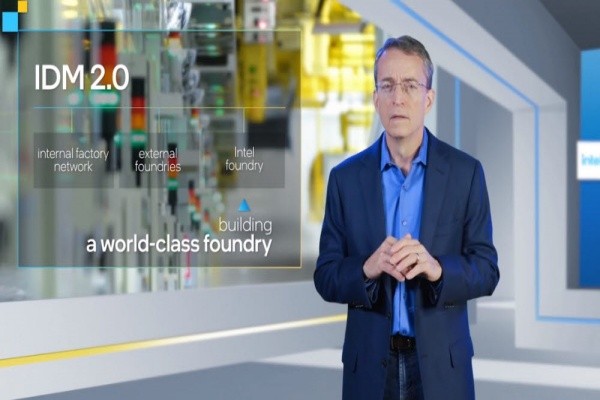Intel, a semiconductor giant, announced that it would start a foundry business. It has decided to set up a separate foundry division and invest $20 billion to build two new semiconductor fabs in the United States. As the world’s biggest IDM (Integrated Device Manufacturer) has decided to start a foundry business, there is expected to be a seismic shift to the global foundry industry. In particular, the move by Intel is deeply related to the U.S. government’s plan to reorganize the semiconductor supply in chain in the country. Intel is expected to take the leading position in the process of the government reorganizing the supply chain.
CEO Pat Gelsinger of Intel announced that the company would build two new foundry fabs in Arizona while announcing the company’s next “IDM 2.0” strategy.
Intel is the world’s biggest CPU manufacturer and it has been operating a small foundry business as well. However, this is the first time that the company has presented an independent foundry business as a new business model.
CEO Gelsinger said that the company would set up a separate foundry division within the company and appoint Dr. Randhir Thakur as the president of Intel Foundry Services. Usually, each division within Intel is overseen by a vice president. The fact that CEO Gelsinger has appointed a president to be the head of Intel Foundry Services indicates that the company plans to give put in maximum efforts into its foundry business.
CEO Gelsinger announced that the company would invest $20 billion in building two new fabs. Such amount easily surpasses the amount (14.3 billion) that the company invested in facilities in 2020. The company explained that the fabs would create more than 3,000 jobs, hire more than 3,000 construction companies, and create more than 15,000 long-term local jobs.
CEO Gelsinger said with confidence that the company would be able to build the world’s best foundry based on the company’s IP (intellectual property) portfolio.
“We plan to provide differentiated products by building a portfolio of IPs based on X86, ARM, and RISC-V.” said CEO Gelsinger. “We are currently receiving support from companies such as Google, IBM, Microsoft, Qualcomm, and Amazon.”

CEO Gelsinger talked about “imbalance in supply and demand of foundry” as an example to why the company has decided to start a foundry business. He particularly emphasized the fact that more than 80% of the cutting-edge foundry market is focused in Asia due to Samsung Electronics, TSMC, and UMC and that semiconductor demands are growing in the United States and Europe which is creating a rapid movement of independence. As a result, he announced that Intel would expand its foundry business based on customers mainly in the United States and Europe.
The announcement by CEO Gelsinger is also an announcement that the company will play the leading position in the U.S. government’s plan to reorganize the semiconductor supply chain in the country. The industry explained that the company’s move is deeply related to President Biden’s plan to promote the country’s semiconductor industry. While signing an executive order on “a review of semiconductor supply chains” last month, President Biden emphasized the importance of being semiconductor independent while physically holding a semiconductor chip.
“We are extremely pleased that we are able to make contributions towards the U.S. economy while working with the Biden administration and the government from Arizona.” said Intel. “Our goal is to improve the industry’s competitive edge and provide support for the government’s key initiative.”
These actions taken by the U.S. government and Intel are expected to create a seismic shift in the global foundry market. As Intel enters the market, intense battles between Asian companies and American companies to gain dominance over the market are expected to take place in the near future. Also, it will be interesting to see what kind of diplomatic strategies the U.S. government, which is pressuring China through sanctions centered around semiconductors during the trade war between the two countries, will carry out in order to gain dominance over the market.
Intel also introduced its plan to utilize outside foundry companies that has gained a lot of attraction from the industry. CEO Gelsinger announced that it would work with TSMC on making next-generation CPU that is expected to be released in 2023.
CEO Gelsinger said that the current EUV process usage under 7 nanometers is starting to be improved and that the company will make different products while working with outside foundry companies such as TSMC, Samsung Electronics, UMC, and GlobalFoundries.
Staff Reporter Kang, Hyeryung | kang@etnews.com